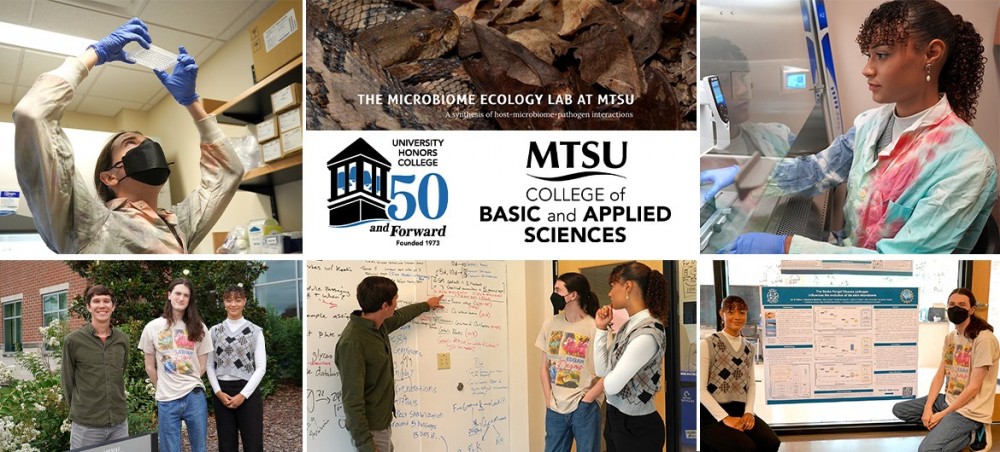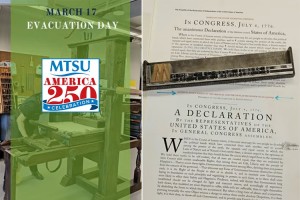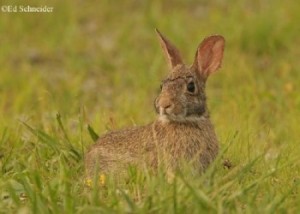Two Middle Tennessee State University Honors students are gaining hands-on experience in cutting-edge biological research through a prestigious Research Experience for Undergraduates, or REU, hosted on campus.
Biology major Ian Wilson and biochemistry major Tatyana Martinez have spent the summer working under the mentorship of Donald Walker, associate professor of biology in the College of Basic and Applied Sciences, in MTSU’s Microbiome Ecology Lab. The students are focused on investigating snake fungal disease, a growing threat to reptile populations, especially in the Southeastern United States.
The Microbiome Ecology Lab at MTSU collaborates with researchers from Oregon State University, the University of California, Riverside, and the University of Utah as part of a broader interdisciplinary effort to explore host-microbiome-pathogen interactions.
Leading the research team is Walker, the principal investigator who develops the core questions driving the lab’s investigations.
“I focus on identifying gaps in student knowledge that not only advance the science, but also create meaningful training opportunities, helping them analyze data and better understand how microorganisms interact within complex systems like the gut microbiome,” he said.
Walker added that the two undergraduate students are operating at a graduate level, carrying out their projects independently from start to finish.
“They’re not just helping with research, they’re coming up with their own ideas, designing experiments, and seeing them through,” he said. “They’ve already uncovered some really interesting results that are contributing to our broader understanding of these microbial systems.”
Understanding rising threat to wildlife
Snake fungal disease, caused by the pathogen Ophidiomyces ophidiicola, is considered an emerging infectious disease of increasing conservation concern. The lab’s research aims to better understand the interactions between this pathogen and the natural microbiome of snakeskin.
“This summer’s REU in particular aims to understand how the snake fungal disease pathogen alters the snakeskin microbiome, and how the microbiome in turn responds to its colonization,” said Martinez. “Investigations into the complex interactions shared between the microbiome and pathogens like SFD allow us to understand potential impacts on host-immune defense and possibilities for future conservation work.”
Wilson added that their work centers on the skin chemistry of infected snakes and how it influences bacterial-fungal interactions.
“We are currently researching how this fungal pathogen alters the snakeskin microbiome through changes to snakeskin chemistry and indirect bacterial-fungal interactions,” he said.
Real-world impact, graduate-level work
Wilson, who has worked in the lab since spring 2024 and completed an REU the previous summer, said this experience has only deepened his passion for conservation biology.
“This REU has been an opportunity that has immensely shaped my future,” he said. “It has given me the training and experience to feel confident in a research setting.”
He also praised the lab environment, calling it “an exciting application of multidisciplinary approaches” and commending Walker’s mentorship.
“He has engaged both Tatyana and me in the context of our research, providing opportunities to operate independently and collect data on the level of graduate researchers,” he added.
For Martinez, the experience has had a transformative effect on her academic and professional goals.
“My time spent with the Walker lab has truly broadened my passion for the natural sciences and strengthened my desire to pursue an investigative research role as a future physician,” she said.
Trials, triumphs, teamwork
Like any advanced scientific endeavor, the project has faced its share of challenges. Both students emphasized how much they’ve learned from problem-solving in the lab.
“We have encountered several challenges this summer,” said Wilson. “It has been a very winding process since May, but I think the biggest help to navigating these challenges has been acting decisively once something has gone unexpectedly and creatively developing solutions.”
Martinez echoed that sentiment, particularly noting the complexity of experimental biology.
“Before starting a project, a lot of time is spent planning, gathering supplies and preparing the materials necessary. Something particularly true for this project since some of the preparation involved the use of biochemical techniques, an area a bit outside of our expertise,” she said.
Thanks to the help from collaborators in the Munafo, Weismiller, Miller, and Kline labs, the team overcame the learning curve.
Sharing work with scientific community
Their efforts reached a wider audience this summer when both students presented research at the 2025 Mycological Society of America annual meeting in Madison, Wisconsin, earning second place among the undergraduate presentations. Including graduates, there were approximately 200 presentations at the conference.
“As undergraduate students, sharing ownership of such a large project and being able to work independently in a laboratory setting has been incredible,” said Martinez. “It’s truly a great way to learn, ask questions, and take pride in your findings.”
Both students credit the REU and the supportive environment of the Microbiome Ecology Lab for shaping their academic and personal growth.
“As I go on to start my fourth semester with the Microbiome Ecology Lab, I look back in awe at how much I have progressed as a student, an investigator, and ultimately as a person,” Martinez reflected. “The Walker Lab has provided me with many unique opportunities to further pursue my passion for science, pushing me to not shy away from the sometimes-hard questions and perhaps even more challenging answers.”
Emphasizing that undergraduate research is a vital part of scientific training, Walker said, “It’s critical. Research gives students the perfect opportunity to connect with science on a deeper level and apply what they’re learning in the classroom. It’s a hands-on way to practice the scientific method, ask real questions, and explore the unknown.”
For more information about the MTSU Microbiome Ecology Lab’s research, visit walkerlabmtsu.weebly.com.
— Robin E. Lee (Robin.E.Lee@mtsu.edu)










